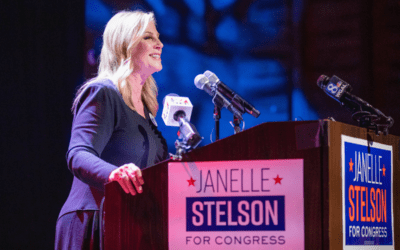
Trump supporters try to break through a police barrier, Wednesday, Jan. 6, 2021, at the Capitol in Washington. As Congress prepares to affirm President-elect Joe Biden's victory, thousands of people have gathered to show their support for President Donald Trump and his claims of election fraud. (AP Photo/Julio Cortez)
They say the Trump supporters’ plan to challenge the certified election results is “eroding public faith.”
The final step in the electoral process will take place Wednesday, and the results are all but guaranteed. Joe Biden will be the next president. President Donald Trump cannot overturn the results.
But the ongoing attempts by Trump and his supporters in Congress to reverse the will of the American people has achieved two major things: It has highlighted the flaws in the electoral process and the need for its reform.
And most importantly and more detrimental, experts say, it has severely eroded Americans’ faith in our system of government.
“This has gone to the very heart of our democratic republic. When representatives start to say the system is rigged, it erodes how the system is supposed to work,” said Meredith McGehee, executive director of Issue One. “It is eroding public faith. It is a lit match that we are playing with at this point. That’s why this is so dangerous. It’s very dangerous for the system.”
Never has there been a situation where a losing candidate—and current president—disputed the results of the election and encouraged his supporters to challenge it as well, said Trevor Potter, president of the Campaign Legal Center.
It leaves open many possibilities and implications for the integrity of future elections, as well as elected officials, he said.
What We Know Will Happen Wednesday (As Outlined in the Electoral Count Act)
A joint session of the US House of Representatives and US Senate will convene at 1 p.m. Wednesday in the House chambers. Members of Congress are there to receive and count the electoral votes certified in each state.
Vice President Mike Pence will serve as the presiding officer. If the Vice President is unable or unwilling to attend, the President Pro Tempore of the Senate—in this case, Iowa Republican Chuck Grassley—presides in his place.
A mahogany box containing the certified electoral votes from each state will be opened individually and in alphabetical order. The state’s electoral vote total will be read. This is when members of Congress can make objections.
Any member of Congress can raise an objection, but it must be in writing and it must be signed by a representative and a senator.
At this point, the session divides—with the Senate returning to its chamber—and each legislative branch debates the objection for no more than two hours. A vote is then held to accept or deny the objection.
The joint session is then reconvened and the results are announced. If the objection is voted down, the electoral votes from that state are counted. If the results are split, the electoral votes certified by the state’s governor are the ones officially included in the count. If the objection is upheld, the state’s electoral votes are thrown out and not counted.
The counting of the electoral votes continues. The process is repeated for each objection made to a state’s electoral vote total.
The Original Intent of Allowing Objections
The Electoral Count Act came about in the 1800s when there were conflicting slates of electors submitted by the states, Potter said. Each state decides under its own procedures and laws how it votes for President and Vice President. The members of Congress are to defer to those results.
The only time Congress should intervene, Potter said, is when there is confusion as to what the results are. This premise is the key point Pennsylvania Republicans in the US House are exploiting to object to the certified results. But the original intent of the law refers to conflicting slates of electors submitted by a state.
Currently, there is only one official vote total from Pennsylvania: 20 electoral votes for Biden. To be true to the Constitution, Potter said, legislatures must accept the state’s duly given results, even if they don’t like them.
Even if an objection is raised, Potter said, there are more than enough representatives and senators in each chamber to carry a majority vote to reject the objection.
What Don’t We Know About the Upcoming Joint Session
Potter pointed out that in certain states where Trump lost, his slate of electors met on their own and mailed their own votes to Congress. They are not certified, but will they be in the maghoney boxes? It’s unlikely, Potter said, but we don’t know for sure.
Will Pence preside over the joint session? That is up in the air as well, but does not play a major role in the outcome, said Rebecca Green, a professor at William & Mary Law School. Under the Electoral Count Act, the presiding officer simply preserves order and decorum during the joint session. It is a limited role and does not have any authority to change or circumvent any part of the proceeding or vote count.
How long will the joint session take? Federal law does not allow either chamber to discuss an objection for more than two hours, Green said, so there is no chance for a filibuster.
But how many states will be objected to?
At this point, we don’t know, Green said. But the Electoral Count Act does provide deadlines in an attempt to ensure the count is complete by Jan. 20. If the joint session lasts for more than five days—i.e. isn’t completed by Jan. 11—Congress must remain in session, with no breaks, until the count is complete.
If, for some reason, the process is not finished by noon on Jan. 20, the Speaker of the House (Nancy Pelosi) will serve as President of the United States until a final count is determined.
“A lot of this depends on what the goal is of [Texas Sen. Ted] Cruz and [Missouri Sen. Josh] Hawley and others,” Potter said. “Do they want to prolong this? Do they want to make their point and move on?”
“This is an exercise in political theater,” Green added, “more than it is in trying to do anything legally.”
What Reforms Are Needed?
It is possible that both the House and Senate could reject the state vote, although not this year, Potter said. If the party in power in both chambers wanted to put their own presidential candidate in office, there is a potential for that to happen with the way the electoral college laws are written now.
Another possibility, again not this year but in the future, is where the count is complete and enough votes have been thrown out that neither candidate reaches 270 electoral votes. Then a state-by-state vote in the House is conducted and a president is elected.
There are ways to undermine the electoral college and it is those loopholes that need to be addressed, experts say.
Support Our Cause
Thank you for taking the time to read our work. Before you go, we hope you'll consider supporting our values-driven journalism, which has always strived to make clear what's really at stake for Pennsylvanians and our future.
Since day one, our goal here at The Keystone has always been to empower people across the commonwealth with fact-based news and information. We believe that when people are armed with knowledge about what's happening in their local, state, and federal governments—including who is working on their behalf and who is actively trying to block efforts aimed at improving the daily lives of Pennsylvania families—they will be inspired to become civically engaged.


For Rep. Susan Wild, supporting PA families includes reproductive rights and much more
Rep. Susan Wild wants to be very clear with Pennsylvanians: Donald Trump is committed to taking away women’s reproductive freedom, but he is not...

School districts working with anti-LGBTQ groups can cost your kids’ schools millions
Parents across South Central Pennsylvania are worried about the potential financial impacts working with anti-LGBTQ groups may have on their school...

VIDEO: Trump distances himself from his anti-abortion views
Donald Trump appeared on WGAL on Tuesday and continued to distance himself from his anti-abortion views claiming that reproductive rights are now a...

VIDEO: Community pushback gets school board to rescind decision on denying gay actor’s visit
Cumberland Valley School Board offered a public apology and voted to reinstate Maulik Pancholy as a guest speaker a week after the board voted to...

VIDEO: Project 2025 brings nuclear armageddon back into vogue
Project 2025 is a titanic document, with plans ranging from cutting half of all government employees to targeting reproductive rights on a scale...





